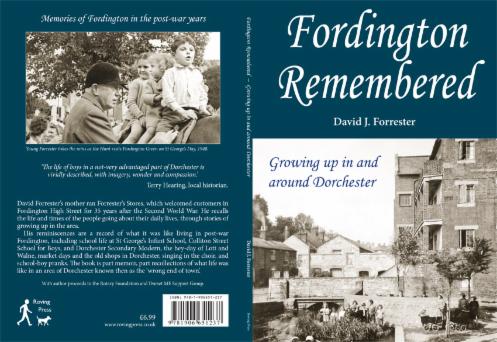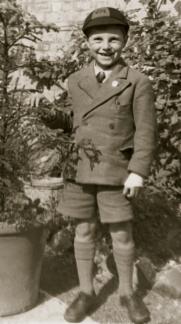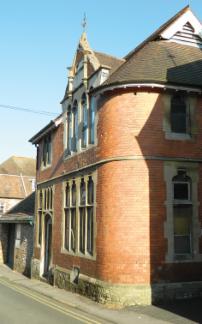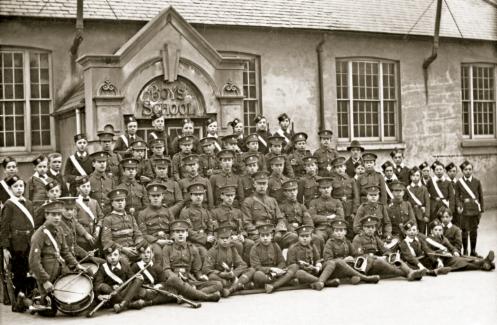 | BOOK DETAILS Title: Fordington Remembered - Growing Up in and Around Dorchester Author: David Forrester RRP: £6.99 Sale Price: £4.99 Publication date: 9 Dec 2013 Format: 212 x 152 mm Number of pages: 80 Illustrations: 73 ISBN: 9781906651-237 Please CLICK HERE for ordering options |
David Forrester’s mother ran Forrester’s Stores, which welcomed customers in Fordington High Street for 35 years after the Second World War. He recalls the life and times of the people going about their daily lives, through stories of growing up in the area.
His reminiscences are a record of what it was like living in post-war Fordington, including school life at St George’s Infant School, Colliton Street School for Boys, and Dorchester Secondary Modern, the hey-day of Lott and Walne, market days and the old shops in Dorchester, singing in the choir, and school-boy pranks. The book is part memoir, part recollections of what life was like in an area of Dorchester known then as the ‘wrong end of town’.
With author proceeds to the Rotary Foundation and Dorset ME Support Group.
PREFACE
Standing in my daughter’s home in St Neots, Cambridgeshire, I watched the children return from school, coats thrown down; they rushed to be first on the computer to play football or some other computer game. This is their world, staring at one of a choice of screens they seem to have. Shiny new bikes stand outside virtually unused, while a friend waits at another screen somewhere across town or maybe in another place altogether – it doesn’t really matter, you can play with anyone anywhere in the world.
Don’t get me wrong, they are not all couch potatoes; one of our granddaughters is a junior world champion rower now studying at Oxford, and the youngest is a promising footballer always keen to tell us how many goals he has scored. However, on the whole, their lives are so different from that experienced by us Fordington boys in the 1940s and ’50s that I felt a need to put it down in writing, to let others know; in a way it is a piece of social history that I felt needed recording, just as their world is recorded daily on Facebook or Twitter.
CONTENTS
Foreword by Terry Hearing
Aerial view
The war years
A new start: Forrester’s Stores
Lott & Walne
St George’s Infants School
Sunday School
The Boys’ School in Colliton Street
Carey Camp
Dorchester Secondary Modern School
Times they are a-changing
Market days
Gypsies in town
Weekend entertainment
St George’s Church
Growing up in Fordington
Fishing
Salisbury Fields
The countryside around
Bockhampton
Yellowham Woods
And finally …
Mill Street Housing Society
EXTRACT FROM THE BOOK
At the age of 7 the boys transferred to St Peter’s Institute, the boys’ school in Colliton Street, and the girls went to Maud Road School. The school badge was red on black with two crossed keys, the latter being a symbol for St Peter. Many of us wore shoes or boots that were the wrong size and much of the clothing never fitted, as hand-me-downs were the order of the day.
 David Forrester, a cheeky school boy aged 7 or 8. |
|
As a church school, religious teaching played a large part in the curriculum. Each Friday morning we were marched in pairs down Grey School Passage to attend assembly in Holy Trinity Church. I particularly enjoyed this, especially the hymn singing; I suppose I also enjoyed the fact that we were missing lessons.
 St Peter’s Institute at the bottom of Colliton Street; we walked up and down the road according to lessons. The building is now used for storage by the Dorset County Museum. |  Old school classrooms in Grey School Passage. |
WHAT REVIEWERS HAVE SAID:
‘The life of boys in a not-very advantaged part of Dorchester is vividly described, with imagery, wonder and compassion.’
Terry Hearing, local author and historian.
‘... within living memory Fordington was regarded as one of the dodgier neighbourhoods of the county town. However, what it lacked in money and status it more than made up for with local pride and friendliness and now both have been celebrated in a delightful book by David Forrester. David … has written Fordington Remembered and filled it with happy memories of growing up there. “…it is a piece of social history that I felt needed recording”.’
Ruth Meech, Dorchester Life
‘... a vivid and affectionate look back at the good old bad old days of a post-war childhood ... captures the fun and freedom of growing up in and around Dorchester ... Sunday School, singing with St George’s Church choir, market days, mischief and memories of characters and places now gone or transformed add up to a delightful account of the county town and its unruly neighbouring parish in the 1940s and 1950s ... full of fine old photographs that will take many a reader down Memory Lane with David as the perfect companion.
Dee Adcock, Blackmore Vale Magazine
‘... illustrated with many fascinating, hitherto unpublished photographs, several credited to Mill St Housing Society; clearly, the author has been able to enthuse the local community with his writing project, and the result is a very worthwhile contribution to the social history of Dorchester.’
Jerry Bird, Dorchester Voice
 | David Forrester lives in Charlton Down. He decided to put his memoirs together to preserve a record of what it was like to be a child in post-war Fordington. The 69-year-old, who was born in London and moved down to Dorset at just three months old during the 1940s, said: ‘When I talked with my friends I realised there was so much stuff that’s going to be lost in the future – memories and information about what life was like in Fordington. I just thought it would be nice to get it all down in print so that future generations can have a look at it.’ David said people might find it interesting to read about how different life was for children then compared to today. ‘The excitement you feel when you see your first book on the shelf is unsurpassed. I can honestly say it has changed my life. There is probably only one downside – I have now caught the bug, my wife says that my life now revolves around research, writing and speaking to various clubs, but I love it. Roving Press have given me something to live for!’ |
Please CLICK HERE for ordering options.
